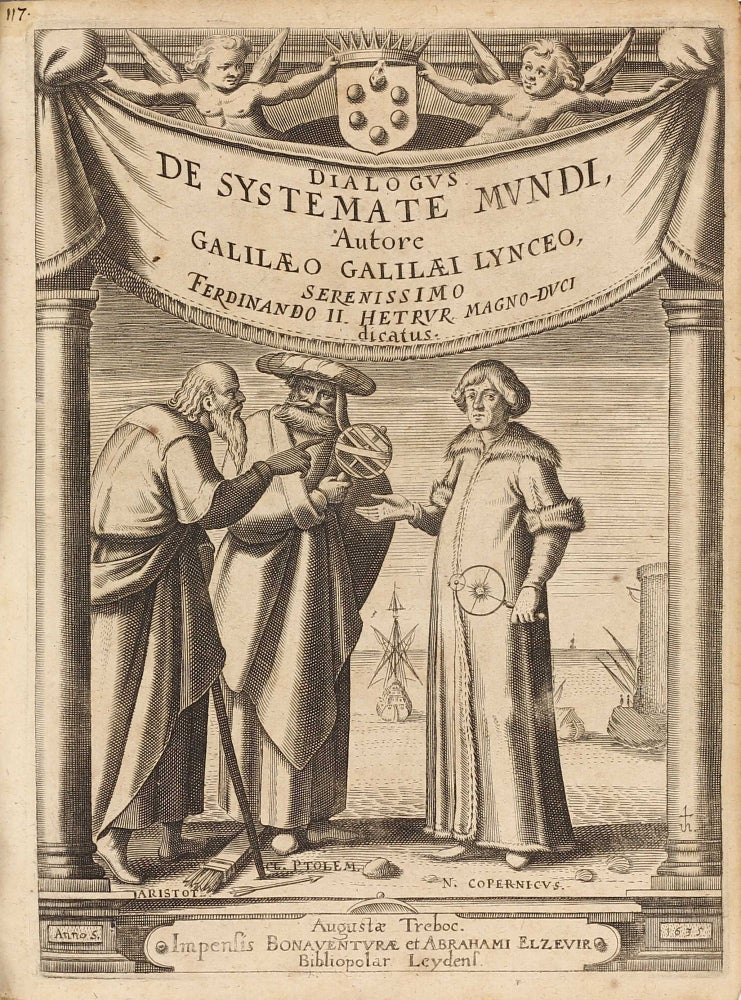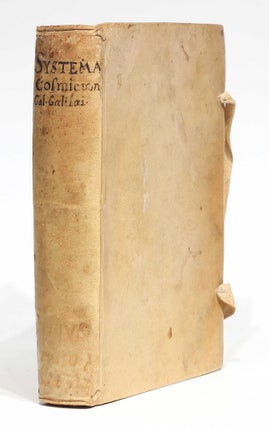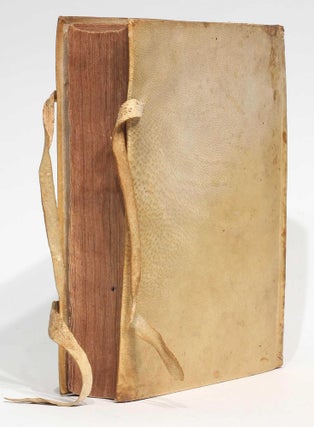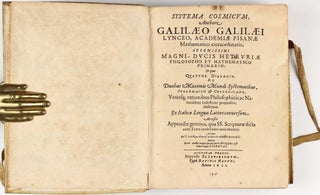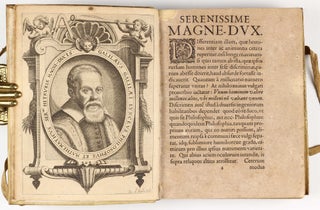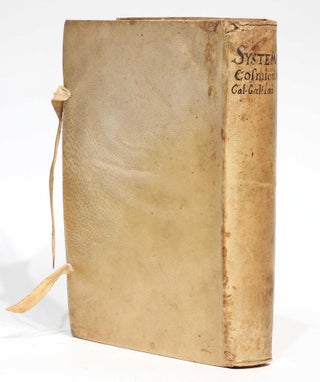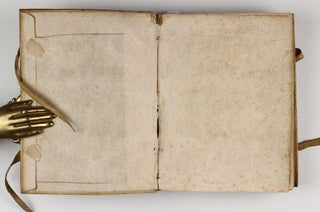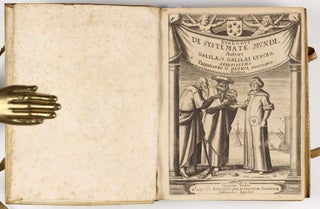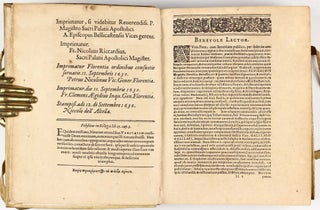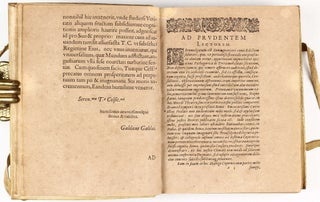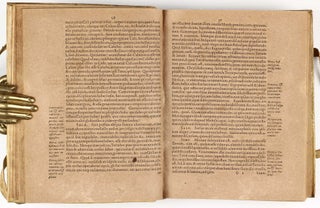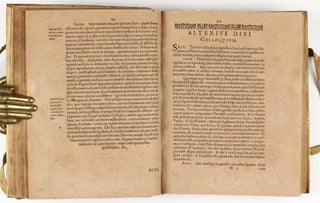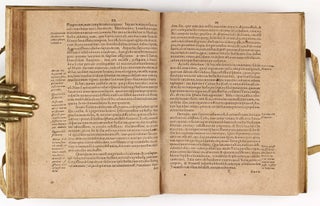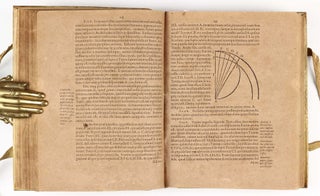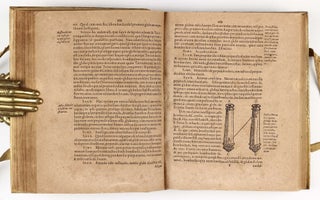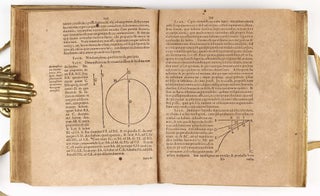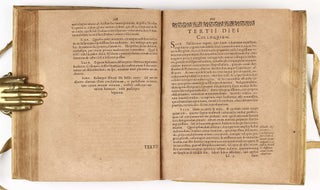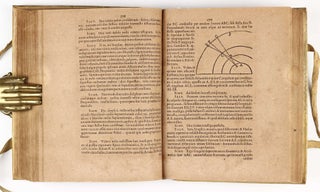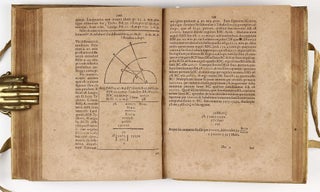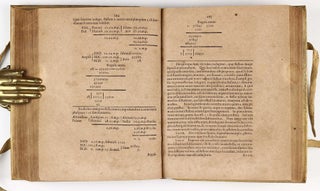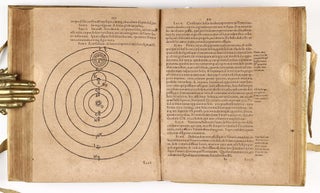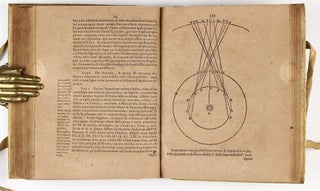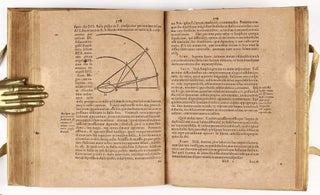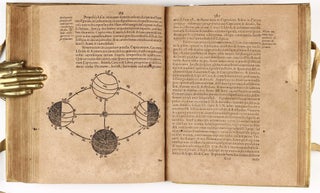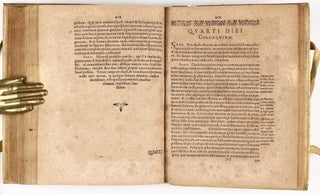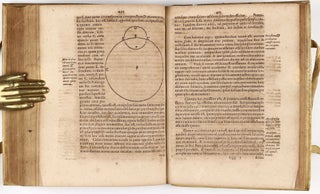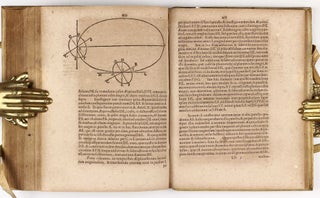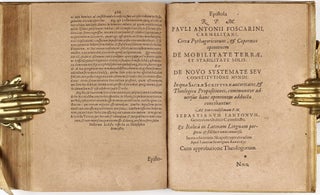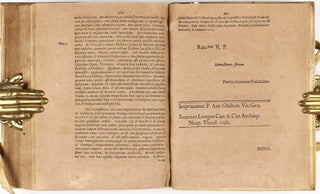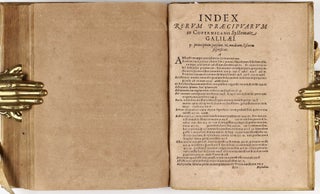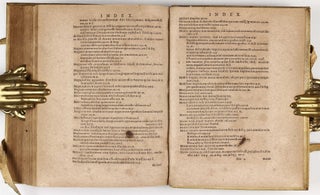Galilei's Dialogo in untouched and well preserved original binding
Systema cosmicum ... in quo quatuor dialogis, de duobus maximis mundi systematibus, Ptolemaico et Copernicano.
Strasbourg: D. Hauttius for the Elzevirs [at Leiden], 1635.
1st Edition. Hardcover. Very Good. Item #003125
8vo (194 x 150 mm), [xvi], 495 [1], [24] pp. Engraved frontispiece, full-page engraved portrait by Jacob van der Heyden, woodcut diagrams, final leaf of errata. Text browned throughout as usual, leaves O3 and 3Q2 with small paper flaw at top blank margin, a few small marginal dampstains and occasional minor spotting. Bound in contemporary vellum, spine lettered in manuscript, ties still present (light browning and spotting of vellum), original endpapers. Provenance: illegible 19th-century ownership slip laid in. Very good unsophisticated copy in completely untouched original binding with old (original?) leather ties still present. ---- Honeyman 1409; Horblit 18c, Dibner 8; Carli-Favaro 32 (148); Caspar 11 (88); Cinti 196 (96); Riccardi I 512. - First Latin and first international edition of Galileo's enormously influential Dialogo demonstrating the validity of the Copernican heliocentric theory over the Ptolemaic theory of the solar system. It was the only major work of Galileo published outside Italy during his lifetime and made a huge impact outside professional scientific circles. If ordinary educated non-Italians read no other Galileo, they read this edition of this text. This edition also influenced generations of scientists outside Italy, among them Mersenne and Gassendi in France, Kepler in Germany and Wilkins and Wallis in England. Galileo's Dialogo is the summation of his ideas, presented in a didactic dialogue. It is a philosophical debate that takes place over four days between three speakers, Salviati (ie. Galileo), Sagredo and Simplicio (both Simplicius the commentator on Aristotle, and 'simplicio' ie. simple or naïve). Salivati puts forward the case for the heliocentric Copernican system and Simplicio puts forward the Aristotelian view. Sagrado, a Venetian nobleman, is the layman who is willing to learn from the other two (but who always agrees with Salivati in the end). The first day is concerned with the principles of motion, which in the second day is extended to include the earth's motion on a daily basis and the principle of relativity in observed motion. The third day treats of the sun's annual motion around the earth, which contains some pro-Copernican arguments, and the fourth gives us Galileo's idea that the ebb and flow of tides is due to the motion of the earth. The text closes with the editio princeps of Kepler's 'Perioche' and a long letter of Foscarini on the opinions of Pittagorichi and Copernicus.' The Dialogue has been described as "the story of the mind of Galileo." The book reveals Galileo as physicist and astronomer, sophisticate and sophist, polemicist and polished writer. Unlike the works of Copernicus and Kepler, the Dialogue was a book for the educated public not just specialists, hence this edition's huge importance. In 1616 the Vatican declared the theories of Copernicus to be "foolish and absurd" and "formally heretical." De Revolutionibus was not banned but changes had to be made to the text, notably the removal of references to the compatibility of the ideas of Copernicus with scripture. Galileo was warned by the Pope not to continue defending the views of Copernicus, to which he acquiesced. In 1623 Maffeo Barberini became Pope. He had written a poem in praise of Galileo's telescopic discoveries and Galileo felt he might now be more receptive to his ideas. Galileo presented a copy of his Il Saggiatore to the Pope in which he ridiculed the Aristotelian views of Horatio Grassi and argued that scientific investigation should not be hindered by reliance on authority. The Pope enjoyed the book and this emboldened Galileo to ask for permission to publish his theories about tides. The Pope agreed on certain conditions. First, no mention was to be made to tides in the title as this would give too much prominence to a phenomenum which was used as evidence that the Earth moved. Second, Galileo was to state that this was only one of the ways in which the tides could have been created. The Dialogo was the result. The Pope felt that he had been misled. Permission had been given for a balanced discussion of the two theories but Galileo had written a barely disguised attempt to demolish the Aristotelian system and to establish the Copernican system as fact. The Pope seemed especially embittered by Galileo's decision to put the Pope's own arguments concerning the tides into the mouth of the simple-minded Simplico, an attempt, as he saw it, to ridicule him. Galileo was summoned to Rome. After interrogation he was told to abjure his Copernican theories and was sentenced to house arrest for life. This Latin translation, through which the Dialogo was to reach the widest audience, is by Matthias Bernegger (1582-1640), an Austrian from Hallstatt, who had studied in Strassburg, where he settled in 1603. In his preface he explains how he came to translate it, how he had taught himself Italian, and how eventually the Elzeviers, at the urging of the Hebraist Marcus Zuerius Boxhorn and others, persuaded him to undertake the work and agreed to publish it. "It is a masterly polemic for the new science. It displays all the great discoveries in the heavens which the ancients had ignored ... The Dialogo, far more than any work, made the heliocentric system a commonplace." Printing and the Mind of Man 128 (of the first Italian edition).
Price: 28,000 € * convert currency
Delivery time up to 10 days. For calculation of the latest delivery date, follow the link: Delivery times
Lieferzeit max. 10 Tage. Zur Berechnung des spätesten Liefertermins siehe hier: Lieferzeiten


